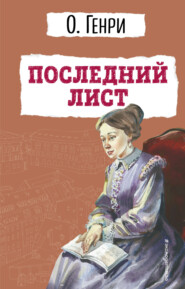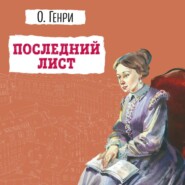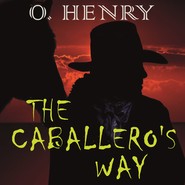По всем вопросам обращайтесь на: info@litportal.ru
(©) 2003-2024.
✖
Heart of the West
Настройки чтения
Размер шрифта
Высота строк
Поля
"Fresh brat!" breathed Miss Erma, beneath her enamelled smile.
"We done the best we could," said Trinidad. "It's tough on Cherokee, but it can't be helped."
Then the door opened and Cherokee entered in the conventional dress of Saint Nick. A white rippling beard and flowing hair covered his face almost to his dark and shining eyes. Over his shoulder he carried a pack.
No one stirred as he came in. Even the Spangler Sisters ceased their coquettish poses and stared curiously at the tall figure. Bobby stood with his hands in his pockets gazing gloomily at the effeminate and childish tree. Cherokee put down his pack and looked wonderingly about the room. Perhaps he fancied that a bevy of eager children were being herded somewhere, to be loosed upon his entrance. He went up to Bobby and extended his red-mittened hand.
"Merry Christmas, little boy," said Cherokee. "Anything on the tree you want they'll get it down for you. Won't you shake hands with Santa Claus?"
"There ain't any Santa Claus," whined the boy. "You've got old false billy goat's whiskers on your face. I ain't no kid. What do I want with dolls and tin horses? The driver said you'd have a rifle, and you haven't. I want to go home."
Trinidad stepped into the breach. He shook Cherokee's hand in warm greeting.
"I'm sorry, Cherokee," he explained. "There never was a kid in Yellowhammer. We tried to rustle a bunch of 'em for your swaree, but this sardine was all we could catch. He's a atheist, and he don't believe in Santa Claus. It's a shame for you to be out all this truck. But me and the Judge was sure we could round up a wagonful of candidates for your gimcracks."
"That's all right," said Cherokee gravely. "The expense don't amount to nothin' worth mentionin'. We can dump the stuff down a shaft or throw it away. I don't know what I was thinkin' about; but it never occurred to my cogitations that there wasn't any kids in Yellowhammer."
Meanwhile the company had relaxed into a hollow but praiseworthy imitation of a pleasure gathering.
Bobby had retreated to a distant chair, and was coldly regarding the scene with ennui plastered thick upon him. Cherokee, lingering with his original idea, went over and sat beside him.
"Where do you live, little boy?" he asked respectfully.
"Granite Junction," said Bobby without emphasis.
The room was warm. Cherokee took off his cap, and then removed his beard and wig.
"Say!" exclaimed Bobby, with a show of interest, "I know your mug, all right."
"Did you ever see me before?" asked Cherokee.
"I don't know; but I've seen your picture lots of times."
"Where?"
The boy hesitated. "On the bureau at home," he answered.
"Let's have your name, if you please, buddy."
"Robert Lumsden. The picture belongs to my mother. She puts it under her pillow of nights. And once I saw her kiss it. I wouldn't. But women are that way."
Cherokee rose and beckoned to Trinidad.
"Keep this boy by you till I come back," he said. "I'm goin' to shed these Christmas duds, and hitch up my sleigh. I'm goin' to take this kid home."
"Well, infidel," said Trinidad, taking Cherokee's vacant chair, "and so you are too superannuated and effete to yearn for such mockeries as candy and toys, it seems."
"I don't like you," said Bobby, with acrimony. "You said there would be a rifle. A fellow can't even smoke. I wish I was at home."
Cherokee drove his sleigh to the door, and they lifted Bobby in beside him. The team of fine horses sprang away prancingly over the hard snow. Cherokee had on his $500 overcoat of baby sealskin. The laprobe that he drew about them was as warm as velvet.
Bobby slipped a cigarette from his pocket and was trying to snap a match.
"Throw that cigarette away," said Cherokee, in a quiet but new voice.
Bobby hesitated, and then dropped the cylinder overboard.
"Throw the box, too," commanded the new voice.
More reluctantly the boy obeyed.
"Say," said Bobby, presently, "I like you. I don't know why. Nobody never made me do anything I didn't want to do before."
"Tell me, kid," said Cherokee, not using his new voice, "are you sure your mother kissed that picture that looks like me?"
"Dead sure. I seen her do it."
"Didn't you remark somethin' a while ago about wanting a rifle?"
"You bet I did. Will you get me one?"
"To-morrow-silver-mounted."
Cherokee took out his watch.
"Half-past nine. We'll hit the Junction plumb on time with Christmas Day. Are you cold? Sit closer, son."
XVII
A CHAPARRAL PRINCE
Nine o'clock at last, and the drudging toil of the day was ended. Lena climbed to her room in the third half-story of the Quarrymen's Hotel. Since daylight she had slaved, doing the work of a full-grown woman, scrubbing the floors, washing the heavy ironstone plates and cups, making the beds, and supplying the insatiate demands for wood and water in that turbulent and depressing hostelry.
The din of the day's quarrying was over-the blasting and drilling, the creaking of the great cranes, the shouts of the foremen, the backing and shifting of the flat-cars hauling the heavy blocks of limestone. Down in the hotel office three or four of the labourers were growling and swearing over a belated game of checkers. Heavy odours of stewed meat, hot grease, and cheap coffee hung like a depressing fog about the house.
Lena lit the stump of a candle and sat limply upon her wooden chair. She was eleven years old, thin and ill-nourished. Her back and limbs were sore and aching. But the ache in her heart made the biggest trouble. The last straw had been added to the burden upon her small shoulders. They had taken away Grimm. Always at night, however tired she might be, she had turned to Grimm for comfort and hope. Each time had Grimm whispered to her that the prince or the fairy would come and deliver her out of the wicked enchantment. Every night she had taken fresh courage and strength from Grimm.
To whatever tale she read she found an analogy in her own condition. The woodcutter's lost child, the unhappy goose girl, the persecuted stepdaughter, the little maiden imprisoned in the witch's hut-all these were but transparent disguises for Lena, the overworked kitchenmaid in the Quarrymen's Hotel. And always when the extremity was direst came the good fairy or the gallant prince to the rescue.
So, here in the ogre's castle, enslaved by a wicked spell, Lena had leaned upon Grimm and waited, longing for the powers of goodness to prevail. But on the day before Mrs. Maloney had found the book in her room and had carried it away, declaring sharply that it would not do for servants to read at night; they lost sleep and did not work briskly the next day. Can one only eleven years old, living away from one's mamma, and never having any time to play, live entirely deprived of Grimm? Just try it once and you will see what a difficult thing it is.
Lena's home was in Texas, away up among the little mountains on the Pedernales River, in a little town called Fredericksburg. They are all German people who live in Fredericksburg. Of evenings they sit at little tables along the sidewalk and drink beer and play pinochle and scat. They are very thrifty people.
Thriftiest among them was Peter Hildesmuller, Lena's father. And that is why Lena was sent to work in the hotel at the quarries, thirty miles away. She earned three dollars every week there, and Peter added her wages to his well-guarded store. Peter had an ambition to become as rich as his neighbour, Hugo Heffelbauer, who smoked a meerschaum pipe three feet long and had wiener schnitzel and hassenpfeffer for dinner every day in the week. And now Lena was quite old enough to work and assist in the accumulation of riches. But conjecture, if you can, what it means to be sentenced at eleven years of age from a home in the pleasant little Rhine village to hard labour in the ogre's castle, where you must fly to serve the ogres, while they devour cattle and sheep, growling fiercely as they stamp white limestone dust from their great shoes for you to sweep and scour with your weak, aching fingers. And then-to have Grimm taken away from you!
Lena raised the lid of an old empty case that had once contained canned corn and got out a sheet of paper and a piece of pencil. She was going to write a letter to her mamma. Tommy Ryan was going to post it for her at Ballinger's. Tommy was seventeen, worked in the quarries, went home to Ballinger's every night, and was now waiting in the shadows under Lena's window for her to throw the letter out to him. That was the only way she could send a letter to Fredericksburg. Mrs. Maloney did not like for her to write letters.
The stump of the candle was burning low, so Lena hastily bit the wood from around the lead of her pencil and began. This is the letter she wrote:

















